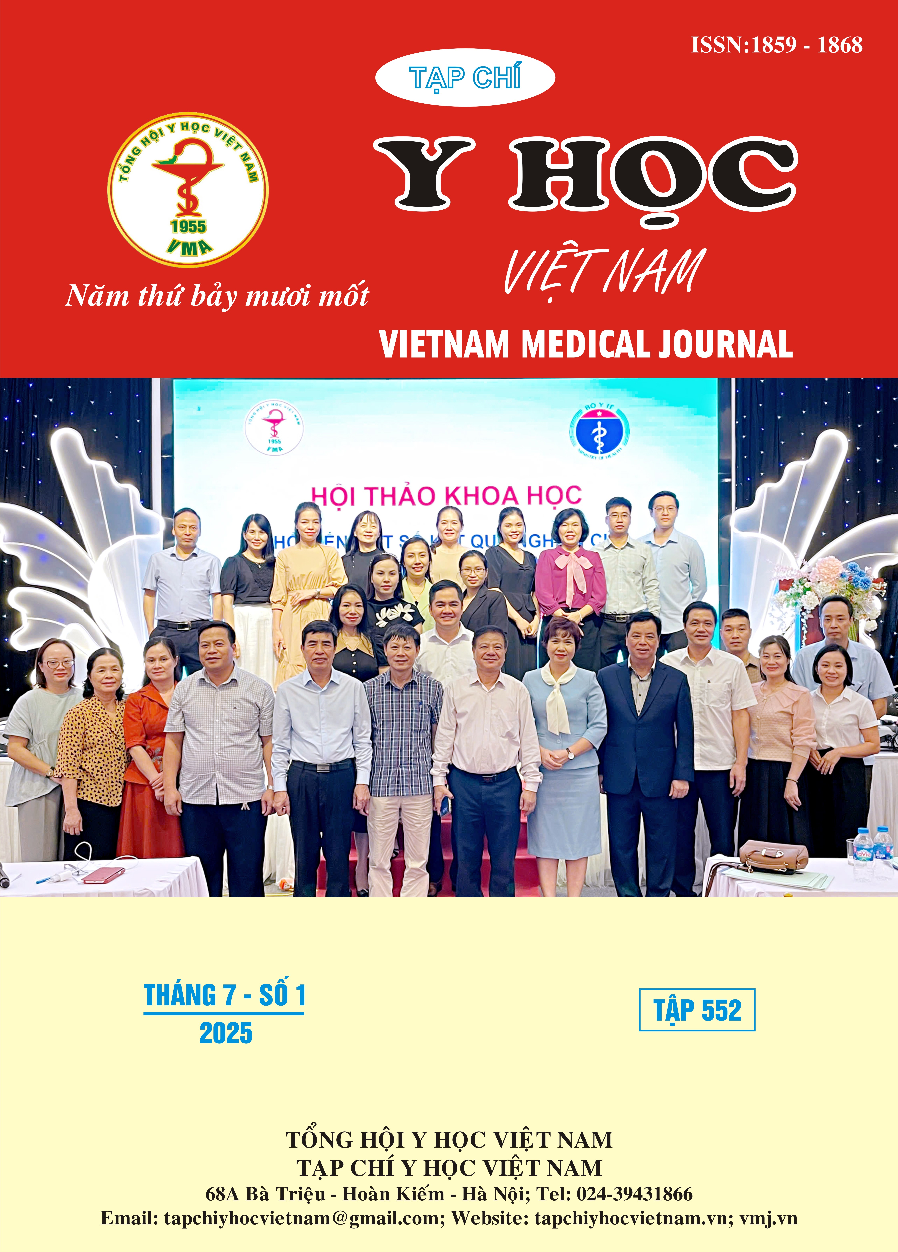ĐÁNH GIÁ THỜI GIAN SỐNG THÊM KHÔNG BỆNH TRÊN BỆNH NHÂN UNG THƯ DẠ DÀY ĐƯỢC HÓA TRỊ BỔ TRỢ PHÁC ĐỒ CAPOX TẠI BỆNH VIỆN HỮU NGHỊ VIỆT ĐỨC
Nội dung chính của bài viết
Tóm tắt
Mục tiêu: Đánh giá thời gian sống thêm không bệnh trên bệnh nhân ung thư dạ dày được hóa trị bổ trợ phác đồ CAPOX tại bệnh viện Hữu nghị Việt Đức. Đối tượng và phương pháp: Nghiên cứu mô tả có theo dõi dọc trên 65 bệnh nhân ung thư dạ dày giai đoạn IB-III dược phẫu thuật triệt căn, điều trị hóa chất phác đồ CAPOX tại Bệnh viện Việt Đức. Kết quả: Tuổi trung bình của bệnh nhân là 58,3, nhóm trên 60 tuổi chiếm 50,7%, 6,2% bệnh nhân dưới 40 tuổi (4/65). Bệnh nhân là nam giới chiếm 75,4%. U ở vị trí hang môn vị là 78,5%. Bệnh nhân ở giai đoạn IIIB chiếm tỷ lệ cao nhất (23,1%), giai đoạn IIB (21,5%) và IIIA (20,0%). 78,5% bệnh nhân được phẫu thuật cắt đoạn dạ dày; 58,5% bệnh nhân được nạo vét hạch D2 mở rộng. 69,2 % bệnh nhân được điều trị hóa chất bổ trợ sau phẫu thuật 4-6 tuần. Thời gian sống thêm không bệnh trung bình là 49,4 ± 3,2 tháng. Tỷ lệ sống thêm không bệnh 3 năm, 5 năm lần lượt là 66,2% và 47,7%. Sống thêm không bệnh 5 năm ở nhóm ung thư biểu mô tuyến biệt hóa vừa (70,2%) cao hơn có ý nghĩa thông kê so với nhóm ung thư kém biệt hóa (44,8%) và tế bào nhẫn (41,1). Tỷ lệ sống thêm không bệnh 5 năm ở nhóm không có xâm nhập mạch - thần kinh cao hơn có ý nghĩa thống kê so với nhóm có xâm nhập mạch thần kinh (p=0,002); Sự khác biệt có ý nghĩa thống kê về sống thêm không bệnh giữa các giai đoạn bệnh theo phân loại TMN; cụ thể khi giai đoạn bệnh tiến triển thì tỷ lệ sống thêm 5 năm giảm dần (p<0,001). Kết luận: Phác đồ hóa chất bổ trợ CAPOX cho thấy hiệu quả trên các bệnh nhân ung thư dạ dày đã phẫu thuật triệt căn, đặc biệt là các bệnh nhân có giai đoạn bệnh II, III.
Chi tiết bài viết
Từ khóa
ung thư dạ dày, điều trị bổ trợ, phác đồ CAPOX
Tài liệu tham khảo
2. Noh, S. H., Park, et al. (2014). Adjuvant capecitabine plus oxaliplatin for gastric cancer after D2 gastrectomy (CLASSIC): 5-year follow-up of an open-label, randomised phase 3 trial. The Lancet. Oncology, 15(12), 1389–1396.
3. Bang, Y.-J., Kim, et al. (2012). Adjuvant capecitabine and oxaliplatin for gastric cancer after D2 gastrectomy (CLASSIC): A phase 3 open-label, randomised controlled trial. Lancet (London, England), 379(9813), 315–321.
4. Greenleaf, E. K., Kulaylat, et al. (2016). Timing of Adjuvant Chemotherapy and Impact on Survival for Resected Gastric Cancer. Annals of Surgical Oncology, 23(13), 4203–4213.
5. Lê Thị Thu Nga, Nguyễn Thị Minh Phương, Lê Đình Roanh. (2022). Đánh giá kết quả điều trị hóa chất bổ trợ phác đồ XELOX sau phẫu thuật ung thư dạ dày triệt căn [Luận án Tiến sĩ y học]. Trường đại học Y Hà Nội.
6. Hồ Văn Chiến, Vũ Hồng Thăng. (2022). Hóa trị bổ trợ phác đồ XELOX tại bệnh viện Ung bướu Nghệ An [Luận văn thạc sĩ y học]. Trường đại học Y Hà Nội.
7. Katai, H., Ishikawa, et al. (2018). Five-year survival analysis of surgically resected gastric cancer cases in Japan: A retrospective analysis of more than 100,000 patients from the nationwide registry of the Japanese Gastric Cancer Association (2001-2007). Gastric Cancer: Official Journal of the International Gastric Cancer Association and the Japanese Gastric Cancer Association, 21(1), 144–154.
8. Wu, L., Liang, et al. (2019). Prognostic significance of lymphovascular infiltration in overall survival of gastric cancer patients after surgery with curative intent. Chinese Journal of Cancer Research = Chung-Kuo Yen Cheng Yen Chiu, 31(5), 785–796.


